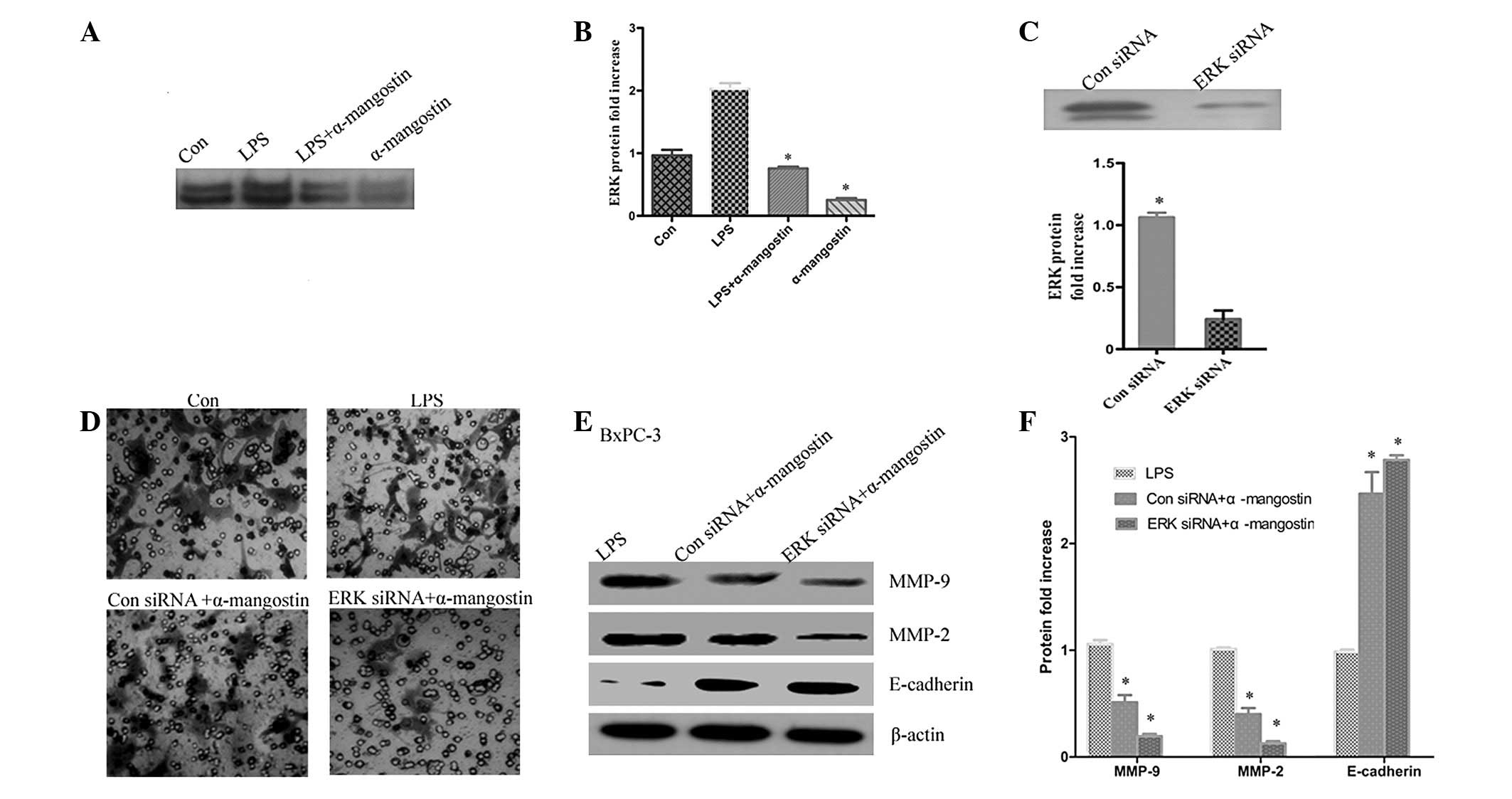|
1
|
Bosetti C, Bertuccio P, Negri E, La
Vecchia C, Zeegers MP and Boffetta P: Pancreatic cancer: overview
of descriptive epidemiology. Mol Carcinog. 51:3–13. 2012.
View Article : Google Scholar : PubMed/NCBI
|
|
2
|
Książkiewicz M, Markiewicz A and Zaczek
AJ: Epithelial-mesenchymal transition: a hallmark in metastasis
formation linking circulating tumor cells and cancer stem cells.
Pathobiology. 79:195–208. 2012.PubMed/NCBI
|
|
3
|
Brunner T: Gemcitabine in the
chemoradiotherapy for locally advanced pancreatic cancer: a
meta-analysis. Strahlenther Onkol. 188:366–367. 2012.(In
German).
|
|
4
|
Ngawhirunpat T, Opanasopi P, Sukma M, et
al: Antioxidant, free radical-scavenging activity and cytotoxicity
of different solvent extracts and their phenolic constituents from
the fruit hull of mangosteen (Garcinia mangostana). Pharm
Biol. 48:55–62. 2010. View Article : Google Scholar : PubMed/NCBI
|
|
5
|
Martínez-Abundis E, García N, Correa F,
Hernández-Reséndiz S, Pedraza-Chaverri J and Zazueta C: Effects of
alpha-mangostin on mitochondrial energetic metabolism.
Mitochondrion. 10:151–157. 2010.PubMed/NCBI
|
|
6
|
Bumrungpert A, Kalpravidh RW, Chuang CC,
et al: Xanthones from mangosteen inhibit inflammation in human
macrophages and in human adipocytes exposed to
macrophage-conditioned media. J Nutr. 140:842–847. 2010. View Article : Google Scholar : PubMed/NCBI
|
|
7
|
Sánchez-Pérez Y, Morales-Bárcenas R,
García-Cuellar CM, et al: The alpha-mangostin prevention on
cisplatin-induced apoptotic death in LLC-PK1 cells is associated to
an inhibition of ROS production and p53 induction. Chem Biol
Interact. 188:144–150. 2010.PubMed/NCBI
|
|
8
|
Lee YB, Ko KC, Shi MD, et al:
Alpha-Mangostin, a novel dietary xanthone, suppresses TPA-Mediated
MMP-2 and MMP-9 expressions through the ERK signaling pathway in
MCF-7 human breast adenocarcinoma cells. J Food Sci. 75:H13–H23.
2010. View Article : Google Scholar : PubMed/NCBI
|
|
9
|
Hung SH, Shen KH, Wu CH, Liu CL and Shih
YW: Alpha-Mangostin suppresses PC-3 human prostate carcinoma cell
metastasis by inhibiting matrix metalloproteinase-2/9 and
urokinase-plasminogen expression through the JNK signaling pathway.
J Agric Food Chem. 57:1291–1298. 2009. View Article : Google Scholar
|
|
10
|
Matsumoto K, Akao Y, Ohguchi K, et al:
Xanthones induce cell-cycle arrest and apoptosis in human colon
cancer DLD-1 cells. Bioorg Med Chem. 13:6064–6069. 2005. View Article : Google Scholar : PubMed/NCBI
|
|
11
|
Lu X and Kang Y: Hypoxia and
hypoxia-inducible factors: master regulators of metastasis. Clin
Cancer Res. 16:5928–5935. 2010. View Article : Google Scholar : PubMed/NCBI
|
|
12
|
Higgins DF, Kimura K, Bernhardt WM, et al:
Hypoxia promotes fibrogenesis in vivo via HIF-1 stimulation of
epithelial-to-mesenchymal transition. J Clin Invest. 117:3810–3820.
2007.PubMed/NCBI
|
|
13
|
Shih YW, Chien ST, Chen PS, Lee JH, Wu SH
and Yin LT: Alpha-mangostin suppresses phorbol 12-myristate
13-acetate-induced MMP-2/MMP-9 expressions via alphavbeta3
integrin/FAK/ERK and NF-kappaB signaling pathway in human lung
adenocarcinoma A549 cells. Cell Biochem Biophys. 58:31–44. 2010.
View Article : Google Scholar : PubMed/NCBI
|
|
14
|
Patel P and Chen EI: Cancer stem cells,
tumor dormancy, and metastasis. Front Endocrinol (Lausanne).
3:1252012.PubMed/NCBI
|
|
15
|
Nakayama K, Nakayama N, Katagiri H and
Miyazaki K: Mechanisms of ovarian cancer metastasis: biochemical
pathways. Int J Mol Sci. 13:11705–11717. 2012. View Article : Google Scholar : PubMed/NCBI
|
|
16
|
Wilmanns C, Steinhauer S, Großmann J,
Schmitt-Gräff A and Ruf G: Cooperate concept of metastasis:
site-specific requirement of activated differentiation and dynamic
deterioration. Cancer Metastasis Rev. 31:269–276. 2012. View Article : Google Scholar : PubMed/NCBI
|
|
17
|
Buda A and Pignatelli M: E-cadherin and
the cytoskeletal network in colorectal cancer development and
metastasis. Cell Commun Adhes. 18:133–143. 2011. View Article : Google Scholar : PubMed/NCBI
|
|
18
|
Kowluru RA, Zhong Q and Santos JM: Matrix
metalloproteinases in diabetic retinopathy: potential role of
MMP-9. Expert Opin Investig Drugs. 21:797–805. 2012. View Article : Google Scholar : PubMed/NCBI
|
|
19
|
Romi F, Helgeland G and Gilhus NE: Serum
levels of matrix metalloproteinases: implications in clinical
neurology. Eur Neurol. 67:121–128. 2012. View Article : Google Scholar : PubMed/NCBI
|
|
20
|
Han L, Zhang HW, Zhou WP, Chen GM and Guo
KJ: The effects of genistein on transforming growth
factor-β1-induced invasion and metastasis in human pancreatic
cancer cell line Panc-1 in vitro. Chin Med J (Engl). 125:2032–2040.
2012.
|




















